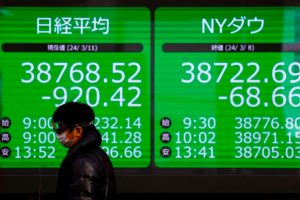Asia’s stock markets experienced a day of high drama on Tuesday as China’s reopening after the Golden Week Holiday saw its mainland markets surge ahead while Hong Kong took a spectacular dive.
China’s domestic markets roared back from their week-long break, hitting two-year peaks with turnover surging past a trillion yuan inside the first 20 minutes of trade.
But the optimism did not spill into regional share markets as Beijing fell short on delivering more details of its massive stimulus. Hong Kong stocks, in particular, took a nosedive, reversing some of the gains they had notched up while China’s markets were closed.
Also on AF: SE Asia Crime Networks Rely on Telegram, Crypto, UN Says
The Shanghai Composite Index rallied 4.59%, or 153.28 points, to 3,489.78, while the Shenzhen Composite Index on China’s second exchange soared 8.89%, or 171.29 points, to 2,098.77.
The biggest gainers were tech hardware makers, brokers, health care companies and builders – all seen likely to get their share of support as the government seeks to boost an economy that has struggled to recover amid a loss of confidence in the wake of a protracted property crisis.
In Hong Kong, however, mainland property developers fell 11%, in one of their largest percentage declines in years as the Hang Seng Index plummeted 9.41%, or 2,172.99 points, to 20,926.79.
Before the Golden Week break, China had announced the most aggressive stimulus measures since the pandemic and the CSI300 gained 25% over five sessions. Last Monday the CSI300 and the Shanghai Composite both notched their largest gains since 2008.
Japan’s Nikkei share average snapped a three-day winning streak to close lower as a stronger yen and Wall Street’s weaker finish overnight weighed on sentiment.
The Nikkei fell 1.00% to close at 38,937.54, after rising 1.8% on Monday. The index has jumped 4% over the last three sessions. The broader Topix was down 1.47%, or 40.24 points, to 2,699.15.
Technology startup investor SoftBank Group slumped nearly 2% to drag the Nikkei index the most.
The yen was a tad stronger at 148.07 per dollar, having slumped to a seven-week low of 149.10 in the previous session. A stronger yen tends to dampen exporters’ shares, as the unit decreases the value of overseas profits in yen terms when firms repatriate them to Japan.
Elsewhere across the region, in earlier trade, the big losses in Hong Kong led the rest of Asia lower with Sydney, Seoul, Singapore, Taipei, Wellington and Manila all in the red. However, Mumbai, Bangkok and Jakarta edged up. MSCI’s broadest index of Asia-Pacific shares outside Japan was down 2.2%.
US Dollar on Back Foot
Stock futures fell broadly, with Eurostoxx 50 futures sliding 1%, while FTSE futures ticked 0.6% lower. S&P 500 futures lost 0.03% and Nasdaq futures fell 0.07%.
In the broader market, investors were reassessing the outlook for the path of the Federal Reserve’s easing cycle after Friday’s blockbuster US jobs report.
Any chance of another 50-basis-point rate cut next month has been erased and traders are pricing in a 12% chance the Fed could keep rates on hold. Just 50 bps worth of cuts are priced in by December.
Expectations of a less-aggressive Fed trajectory kept the benchmark 10-year US Treasury yield above 4% in Asia trade. The two-year US Treasury yield hovered near its highest level in over a month and last stood at 3.9499%.
Still, the US dollar failed to get a further lift on the revised Fed expectations, having already had a strong run last week, in part because of safe-haven gains linked to escalating tensions in the Middle East.
The dollar was on the back foot, falling 0.17% against the Japanese yen to 147.95, while sterling rose 0.06% to $1.30925.
Against a basket of currencies, the greenback eased 0.08% to 102.40, though it hovered near a seven-week high hit on Friday.
Fears of a widening conflict in the Middle East also sapped bullish sentiment after Hezbollah on Monday fired rockets at Israel’s third-largest city, Haifa, and Israel looked poised to expand its offensive into Lebanon, one year after the devastating Hamas attack on Israel that sparked the Gaza war.
In commodities, oil prices pared some of their gains after jumping on Monday due to worries about supply disruptions, with Brent crude futures last down 1.5% at $79.74 a barrel.
Elsewhere, spot gold was little changed at $2,644.70 an ounce.
Key figures
Tokyo – Nikkei 225 < DOWN 1.00% at 38,937.54 (close)
Hong Kong – Hang Seng Index < DOWN 9.41% at 20,926.79 (close)
Shanghai – Composite > UP 4.59% at 3,489.78 (close)
London – FTSE 100 < DOWN 1.28% at 8,197.11 (0934 BST)
New York – Dow < DOWN 0.94% at 41,954.24 (Monday close)
- Reuters with additional editing by Sean O’Meara
Read more:
Chinese Firms Plan to Raise $15bn in Overseas Bond Issues
Nikkei Rallies on US Jobs, Weak Yen; Hang Seng Hits 2-Year High
Foxconn’s AI Bonanza Continues as it Posts Record Q3 Revenue
Hang Seng’s Hot Streak Continues, Middle-East Drags on Nikkei
























